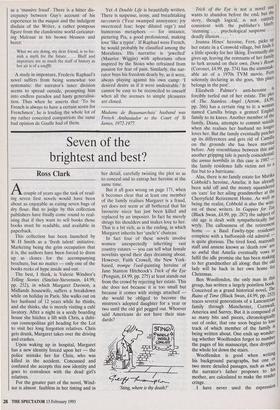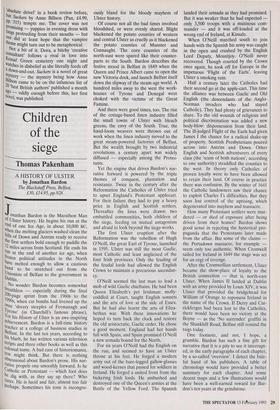Seven of the brightest and best?
Ross Clark
Acouple of years ago the task of read- ing seven first novels would have been about as enjoyable as eating seven bags of dry flour. But to judge by this collection publishers have finally come round to real- ising that if they want to sell books those books must be readable, and available in paperback.
This collection has been launched by W H Smith as a 'fresh talent' initiative. Marketing being the grim occupation that it is, the authors have been forced to dress up as clones for the accompanying brochure, but no matter — only one of the books reeks of hype inside and out.
The best, I think, is Valerie Windsor's Telling Stories (Sinclair-Stevenson, £4.99, pp. 252), in which Margaret Davison, a Midlands housewife, suffers a breakdown while on holiday in Paris. She walks out on her husband of 12 years while he thinks, and she thinks, she is merely visiting a café lavatory. After a night in a seedy boarding house she hitches a lift with Chris, a dubi- ous cosmopolitan girl heading for the Lot to visit her long forgotten relatives. Chris gets drunk, Margaret takes over the driving and crashes.
Upon waking up in hospital, Margaret has a new identity forced upon her — the police mistake her for Chris, who was killed in the accident. Concussed and confused she accepts this new identity and goes to convalesce with the dead girl's relatives.
For the greater part of the novel, Wind- sor is almost faultless in her timing and in her detail, carefully twisting the plot so as to conceal and to entrap her heroine at the same time.
But it all goes wrong on page 171, when it becomes clear that at least one member of the family realises Margaret is a fraud, yet does not seem at all bothered that his favourite niece has just been killed and replaced by an imposter. In fact he merely shrugs his shoulders and makes love to her. That is a bit rich; as is the ending, in which Margaret inherits her 'uncle's' chateau.
In fact four of these novels involve women unexpectedly inheriting vast country estates — you can tell what female novelists spend their days dreaming about. However, Faith Crowell, the New York- based, trompe /bed-painting heroine of Jane Stanton Hitchcock's Trick of the Eye (Penguin, £4.99, pp. 275) at least stands out from the crowd by rejecting her estate. This she does not because it is too small but because it comes with strings attached she would be obliged to become the mistress's adopted daughter for a year or two until the old girl pegged out. Whoever said Americans do not have their stan- dards? Trick of the Eye is not a novel one wants to abandon before the end, but the story, though logical, is not entirely consistent with the publisher's
blurb.
`stunning . . psychological suspense . • deadly illusion , ' Joanna Hines' heroine, Fern, picks up her estate in a Cotswold village, but finds it
a little spooky for her liking. Eventually shegives up, leaving the remnants of her familY to lurk around on their own. Dora's Room (Coronet, £4.99, pp. 374) has the unmistak- able air of a 1970s TVM movie, Fern solemnly declaring as she goes, 'this place belongs in the past'. Elizabeth Palmer's anti-heroine is forcibly turfed out of her estate. The plot of The Stainless Angel (Arrow, £4.99' pp. 266) has a certain ring to it: a woman named Camilla brings a genteel English family to its knees. Another member of the family, Diana, attempts to commit suicide when she realises her husband no longs loves her. But the family eventually patches up its differences and gets rid of Camilla on the grounds she has been married , before. Any resemblance between this On another gripping tale is purely coincidental' the annus horribilis in this case is 1987 -- the family residence falls victim not to a fire but to a hurricane.
Alas, there is no family estate for Marika Cobbold's heroine, Amelia; it has already been sold off and the money squandered on 'care' for her ailing grandmother at the Cherryfield Retirement Home. As well as being the realist, Cobbold is also the witti- est of these writers. In Guppies for Tea (Black Swan, £4.99, pp. 287) the subject 0', old age is dealt with sympathetically but wryly. The callousness of the retirement home — a Basil Fawlty-type residence complete with a buffoonish old admiral --- is quite glorious. The tired food, matronlY staff and annexe known as 'death row' are so awful that Amelia eventually vows to fulfil the idle promise she has been making to her grandmother all along: that the old lady will be back in her own home for Christmas. Ben Woolfenden, the only man in this group, has written a largely pointless book' Conceived as a grand historical novel, The, Ruins of Time (Black Swan, £4.99, pp. 253) traces several generations of a Lancastrian family through Manchester, Cornwall,' America and Surrey. But it is composed or so many bits and pieces, chronologically out of order, that one soon begins to lose track of which member of the family Is being written about. One ends up wonder- ing whether Woolfenden forgot to number the pages of his manuscript, then dropped the whole lot down the stairs.
Woolfenden is good when writing his background paragraphs, but one or two more detailed passages, such as when narrator's father proposes to his mother, are calculated to make the reader cringe.
I have never used the expression
`absolute drivel' in a book review before, but Suckers by Anne Bilison (Pan, £4.99, PP- 315) tempts me. The cover was not Promising — yuppies in evening dress with fangs protruding from their mouths — but one did at least hope that the vampire theme might turn out to be metaphorical. Not a bit of it. Dora, a bitchy 'creative consultant' follows a rival in love into kensal Green cemetery one night and watches in disbelief as she literally feeds off a down-and-out. Suckers is a novel of great mystery — the mystery being how Anne %Non came to be on the infamous list of 20 'best British authors' published a month ago — oddly enough before this, her first novel, was published.



















































 Previous page
Previous page